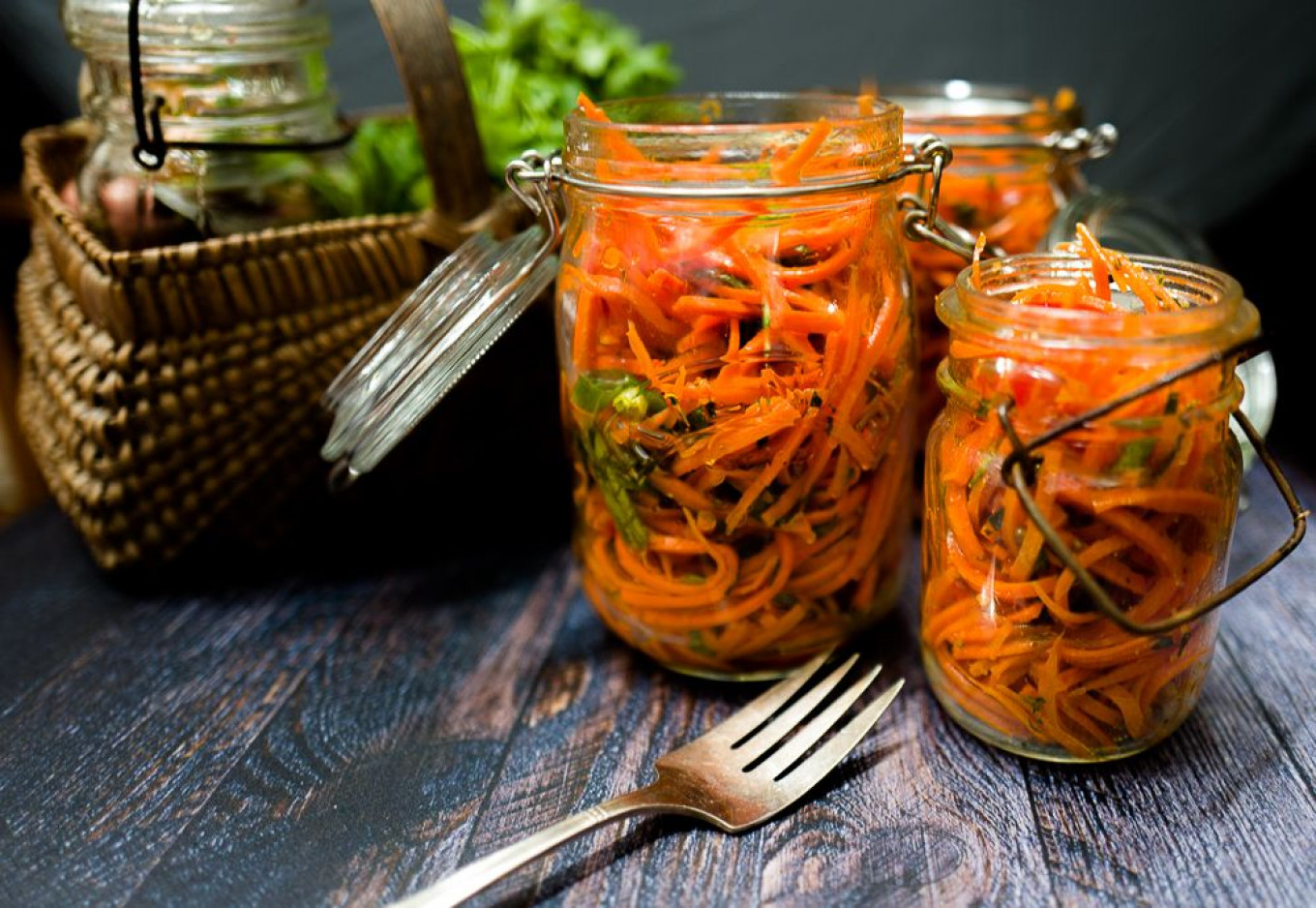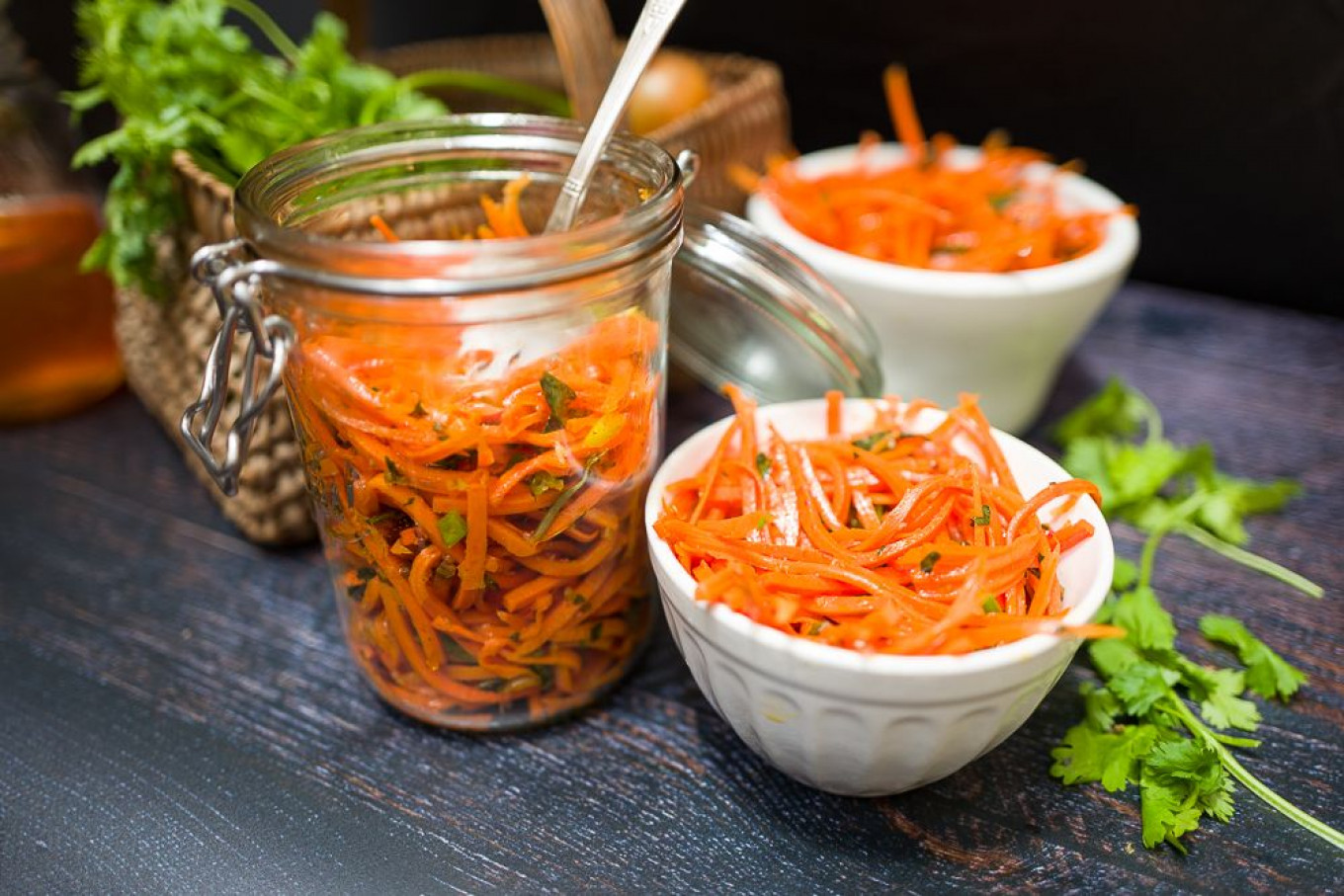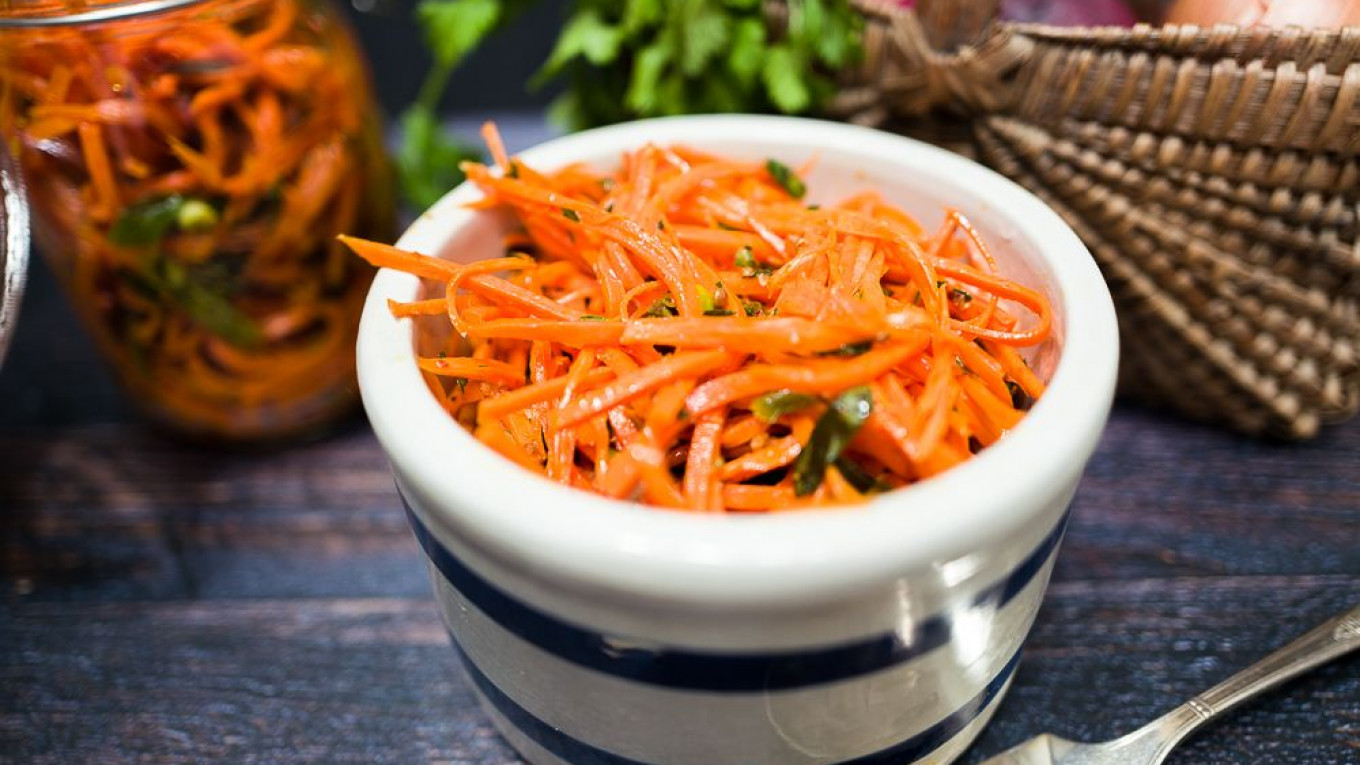It’s a rare thing for me to advocate toning down spice notes or flavor accents in a Russian dish — I am the gal who puts sumac, ginger, and horseradish in borscht — but with Morkovcha, it was beyond time for an intervention.
Morkovcha is a spicy carrot salad better known in Russia as “Korean Carrot Salad.” Morkovcha is ubiquitous in all its various iterations in almost every supermarket or farmers’ market from Kaliningrad to Khabarovsk and enjoys immense popularity anywhere in the world where the Russian diaspora has put down roots. The only place you won’t find it is Korea.
Morkovcha harkens back to the flourishing community of ethnic Koreans — the Koryo-Saram — who migrated to Russia’s Far East in the mid-nineteenth century. Mounting fears about Japan in the late 1930s led to the forced migration of over 170,000 of the Koryo-Saram from the Far East to Central Asia, one of Stalin’s cruel resettlements, which resulted in the deaths of over 40,000. In Uzbekistan, the community adapted their cuisine to local ingredients, most famously making a version of kimchi from carrots instead of cabbage and seaweed. The result is even more famous than the music of the late Victor Tsoi, a prominent descendent of the Koryo-Saram.
I first encountered Morkovcha in Moscow’s farmers’ markets. Tucked away in a corner was a small stand that announced itself meters away by a sharp briny smell of tart vinegar cut with more exotic Asian notes I could never quite identify accurately. At the stand was a crazy quilt of jewel-toned salads made from eggplant, celery root, and beets, and many vegetables (or maybe meat substitutes?) I could not recognize. The stand also sold a wide range of plastic mandolines and hand-held julienne cutters to achieve the enviable uniformity of size and shape of the vegetable slices and dices. But it was the taste that blew my mind — and possibly the roof of my mouth off as well; they did not stint on the chili pepper, which so dominated the salads, I had some trouble discerning other flavors.
“Wasabi?” I asked the Central Asian saleswomen, who smiled a mouthful of gold teeth and looked enigmatic.
“Lighter fluid?” I muttered, turning towards a drinks kiosk to buy a 2-liter bottle of water to dampen down the flames in my mouth.
But the quest continued. Over the years, I sampled many versions of Morkovcha: some bland and tasteless, veering more towards the sweet North American version, which feature raisins and nuts. Others stayed true to the Asian method of sizzling hot oil infused with aromatics. And I came to believe that what was missing was a golden mean between the two: something with a robust flavor that doesn’t qualify as culinary arson.
So here is another modest contribution to Russia’s ecumenical culinary canon.
I’ve kept the traditional method of infusing oil with aromatics but added a step of blooming the spices in the hot oil to intensify their flavor. Horseradish provides a strong spicy undercurrent, while honey brings the entire thing together into a salad that can do anything Cole slaw might do, but with far more panache. Just before serving, I brighten up the dish with fresh chopped herbs such as parsley, dill, basil, and mint, and thinly sliced chives or scallions, making this an ideal dacha dish to savor in the countryside.
Try it with grilled shashlyk, as a topping for a poke or grain bowl, or toss it into a green salad for a lovely contrasting texture. If you are still prudently observing social distancing, this is easy to concoct using basic ingredients you should have lurking in the pantry. If you are venturing out, bring it to a potluck or picnic: I guarantee you will come home with an empty bowl.

Morkovcha
Ingredients
- 6-8 medium-sized carrots, peeled, then spiralized or cut into long, thin matchsticks (use a Mandoline or julienne peeler rather than the food processor, and don’t use a grater)
- 1 medium yellow onion, cut into ½-inch rounds
- 4 cloves garlic, grated on a fine grater
- ⅓ cup (80 ml) neutral oil such as Grapeseed, Canola, or vegetable: something with a high burn point.
- ¼ cup (60 ml) olive oil
- ¼ cup (60 ml) white vinegar or Rice vinegar
- ¼ cup (60 ml) honey
- 2 Tbsp prepared horseradish
- 2 Tbsp whole coriander seeds
- 1 Tbsp sweet red pepper flakes
- 2 Tbsp of salt
- 1 cup (240 ml) chopped fresh herbs such as basil, mint, dill, cilantro, or parsley
- 4 scallions or a bunch of chives, finely minced
Instructions
- Toss the prepared carrots in 2 Tbsp of salt and set in a colander to drain for 1-2 hours.
- Heat the neutral oil in a skillet until sizzling. Add the onion rounds and cook until they start to char (about 5 minutes). Remove the skillet from the heat and discard the onions (or use for another purpose). Reserve the oil in the skillet.
- In a clean skillet, toast the coriander seeds and sweet pepper flakes until they give off an odor. Watch carefully to ensure they don’t scorch.
- Crush the coriander seeds in a mortar and pestle or with the back of a wooden spoon.
- Pat the carrots dry and put them in a large, non-reactive bowl.
- Return the skillet with the oil to medium heat. Add the toasted spices and stir until they are slightly sizzling. Pour the oil and spice mixture over the carrots and toss vigorously to combine.
- Whisk the olive oil, honey, horseradish, and vinegar together and add to the carrots. Taste and adjust seasoning with more salt and vinegar if needed.
- Let the mixture chill for 4-6 hours or more to allow the flavors to combine. Just before serving, toss the carrots with the chopped fresh herbs and scallions or chives.

A Message from The Moscow Times:
Dear readers,
We are facing unprecedented challenges. Russia's Prosecutor General's Office has designated The Moscow Times as an "undesirable" organization, criminalizing our work and putting our staff at risk of prosecution. This follows our earlier unjust labeling as a "foreign agent."
These actions are direct attempts to silence independent journalism in Russia. The authorities claim our work "discredits the decisions of the Russian leadership." We see things differently: we strive to provide accurate, unbiased reporting on Russia.
We, the journalists of The Moscow Times, refuse to be silenced. But to continue our work, we need your help.
Your support, no matter how small, makes a world of difference. If you can, please support us monthly starting from just $2. It's quick to set up, and every contribution makes a significant impact.
By supporting The Moscow Times, you're defending open, independent journalism in the face of repression. Thank you for standing with us.
Remind me later.







